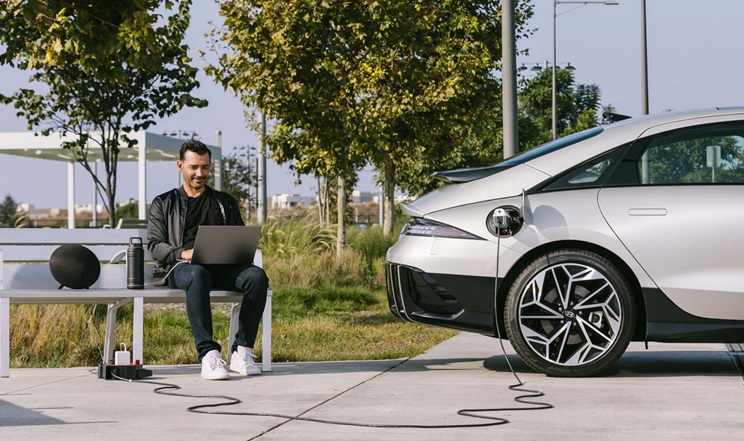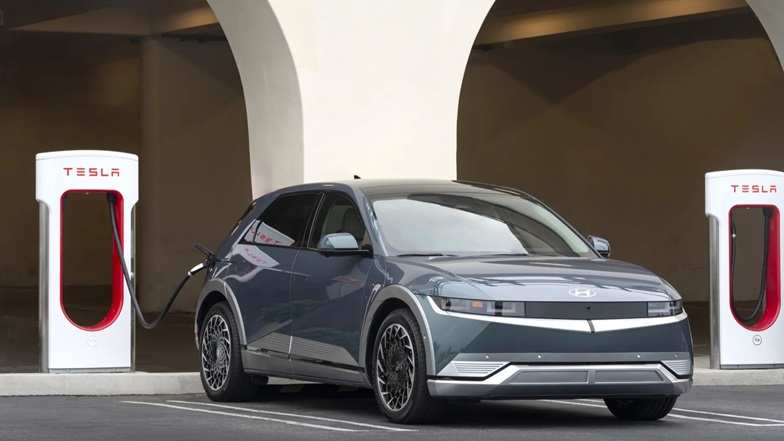Hyundai is making waves in the EV world with its latest announcement: the rollout of free adapters for Tesla Superchargers, giving its electric vehicle (EV) customers expanded access to one of the largest charging networks in North America. Starting in early 2025, Hyundai drivers will be able to request complimentary NACS (North American Charging Standard) adapters, enabling compatibility with Tesla Supercharger stations.
Here’s what this means for Hyundai EV owners and the broader electric vehicle landscape.

Free Adapters for Hyundai EV Owners
Hyundai has committed to offering free NACS adapters to U.S. customers with eligible vehicles. Drivers who own or lease a Hyundai EV by January 31, 2025, and still have the vehicle, will be able to request the adapter at no cost, including shipping. While the specifics about how to claim the adapters and additional terms will be revealed closer to the rollout, Hyundai has made it clear that all of its U.S.-market EVs are eligible.
The full list of eligible vehicles includes:
- Hyundai Kona Electric (model years 2018–2025)
- Hyundai Ioniq Electric (2017–2022)
- Hyundai Ioniq 5 (2022–2024)
- Hyundai Ioniq 5 N (2025)
- Hyundai Ioniq 6 (2023–2025)
Additionally, Hyundai’s luxury brand, Genesis, will also be part of the program, with specific details to follow in early 2025.
A More Inclusive Approach Compared to Kia
Hyundai’s adapter program stands out when compared to its corporate sibling, Kia. While Hyundai is making the adapters available to all its eligible EVs, Kia has limited its offering. Kia’s NACS-to-CCS adapters are only available for the 2024 and 2025 models of the EV6 and EV9, excluding earlier buyers and Niro EV owners altogether.
This inclusive approach by Hyundai highlights its commitment to ensuring a seamless transition for all customers, regardless of their vehicle’s model year.
The Shift to NACS Ports
Looking ahead, Hyundai is phasing out CCS (Combined Charging System) ports in favor of native NACS ports across its future EV lineup. This transition begins with the 2025 Hyundai Ioniq 5, which will be the first mass-market, non-Tesla vehicle to feature a built-in NACS port.
Other upcoming models, such as the 2026 Hyundai Ioniq 9 and Genesis Electrified GV70, will also adopt NACS, reflecting a broader trend among automakers to standardize on this charging interface.
However, Hyundai has acknowledged that its vehicles will initially charge more slowly at Tesla Supercharger stations due to the current limitations of the network. The Tesla Supercharger V3 cabinets are not optimized for the 800-volt architecture of Hyundai’s E-GMP platform, which powers vehicles like the Ioniq 5 and Ioniq 6.
This issue is expected to be resolved in 2025 with the introduction of Tesla’s V4 Supercharger cabinets, capable of supporting 800-volt charging rates. Until then, Hyundai drivers may experience slower charging speeds when using NACS adapters with Tesla Superchargers compared to CCS chargers.
Balancing Adapters in the Interim
While the industry shifts toward NACS, the need for adapters will persist, particularly for older Hyundai EV models. Hyundai’s current CCS-based vehicles won’t have immediate access to Tesla Superchargers until the adapters become available.
Future Hyundai models with built-in NACS ports, starting with the 2025 Ioniq 5, will seamlessly integrate with Tesla’s network. This shift eliminates the need for adapters altogether for these newer models.

Hyundai’s Growing EV Market Share
Hyundai’s announcement is significant as the automaker continues to solidify its position as a major player in the EV market. In fact, Hyundai recently became the second-largest EV seller in North America, trailing only Tesla.
The company’s current lineup includes:
- Ioniq 5 and Ioniq 5 N crossovers
- Ioniq 6 sedan
- Kona Electric SUV
This robust selection, combined with the upcoming enhancements in charging compatibility, positions Hyundai as a formidable competitor in the electric mobility space.
Kia and Genesis: Similar Foundations, Different Paths
Hyundai’s EV strategy is closely linked to its corporate siblings Kia and Genesis, as all three brands share the same E-GMP platform for their electric vehicles. However, their approaches to charging compatibility differ significantly.
While Hyundai is embracing a more inclusive strategy with free adapters for all eligible vehicles, Kia has opted for a more limited rollout. On the other hand, Genesis, Hyundai’s luxury brand, is also joining the shift to NACS ports, with future models set to include the standard natively.
The Future of EV Charging
Hyundai’s transition to NACS is part of a broader movement within the automotive industry, as more automakers adopt Tesla’s widely recognized charging standard. This shift promises to simplify the charging experience for EV owners by consolidating charging interfaces and expanding access to Tesla’s vast Supercharger network.
In the interim, Hyundai’s decision to offer free NACS adapters ensures that its current customers can take advantage of these advancements without being left behind.
For Hyundai EV owners, the rollout of NACS adapters offers a significant advantage, but there are some practical considerations to keep in mind:
- Request the Adapter Early: Make sure to apply for the free adapter as soon as the program launches in early 2025 to avoid delays.
- Understand Charging Speed Limitations: Be aware of potential slower charging speeds at Tesla Superchargers until V4 cabinets are widely available.
- Check Compatibility: Confirm that your Hyundai EV is eligible for the adapter.
Hyundai’s decision to provide free Tesla Supercharger adapters to its EV customers is a bold and customer-centric move. By ensuring compatibility with Tesla’s extensive charging network, the automaker is making EV ownership more convenient and accessible for its drivers.
As Hyundai transitions its lineup to NACS ports and Tesla upgrades its Supercharger network, the EV charging experience is set to become faster and more seamless. With this forward-thinking approach, Hyundai is not only enhancing its current customer experience but also paving the way for the future of electric mobility.
For Hyundai EV owners, the road ahead looks promising—full of power, convenience, and compatibility.
Related Post
